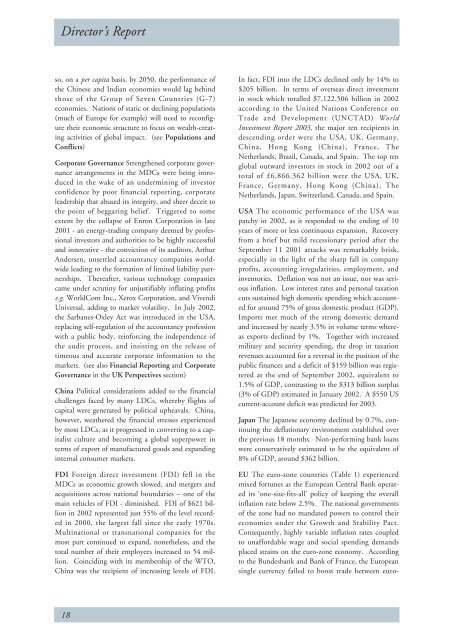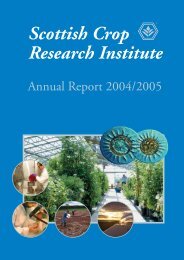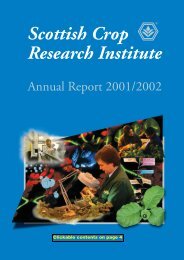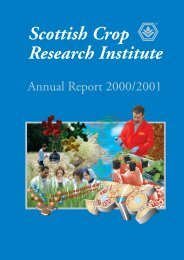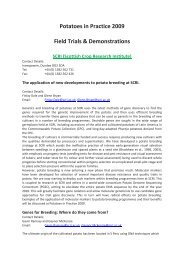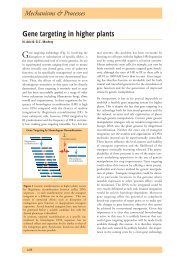PDF file: Annual Report 2002/2003 - Scottish Crop Research Institute
PDF file: Annual Report 2002/2003 - Scottish Crop Research Institute
PDF file: Annual Report 2002/2003 - Scottish Crop Research Institute
Create successful ePaper yourself
Turn your PDF publications into a flip-book with our unique Google optimized e-Paper software.
Director’s <strong>Report</strong><br />
so, on a per capita basis, by 2050, the performance of<br />
the Chinese and Indian economies would lag behind<br />
those of the Group of Seven Countries (G-7)<br />
economies. Nations of static or declining populations<br />
(much of Europe for example) will need to reconfigure<br />
their economic structure to focus on wealth-creating<br />
activities of global impact. (see Populations and<br />
Conflicts)<br />
Corporate Governance Strengthened corporate governance<br />
arrangements in the MDCs were being introduced<br />
in the wake of an undermining of investor<br />
confidence by poor financial reporting, corporate<br />
leadership that abused its integrity, and sheer deceit to<br />
the point of beggaring belief. Triggered to some<br />
extent by the collapse of Enron Corporation in late<br />
2001 - an energy-trading company deemed by professional<br />
investors and authorities to be highly successful<br />
and innovative - the conviction of its auditors, Arthur<br />
Andersen, unsettled accountancy companies worldwide<br />
leading to the formation of limited liability partnerships.<br />
Thereafter, various technology companies<br />
came under scrutiny for unjustifiably inflating profits<br />
e.g. WorldCom Inc., Xerox Corporation, and Vivendi<br />
Universal, adding to market volatility. In July <strong>2002</strong>,<br />
the Sarbanes-Oxley Act was introduced in the USA,<br />
replacing self-regulation of the accountancy profession<br />
with a public body, reinforcing the independence of<br />
the audit process, and insisting on the release of<br />
timeous and accurate corporate information to the<br />
markets. (see also Financial <strong>Report</strong>ing and Corporate<br />
Governance in the UK Perspectives section)<br />
China Political considerations added to the financial<br />
challenges faced by many LDCs, whereby flights of<br />
capital were generated by political upheavals. China,<br />
however, weathered the financial stresses experienced<br />
by most LDCs, as it progressed in converting to a capitalist<br />
culture and becoming a global superpower in<br />
terms of export of manufactured goods and expanding<br />
internal consumer markets.<br />
FDI Foreign direct investment (FDI) fell in the<br />
MDCs as economic growth slowed, and mergers and<br />
acquisitions across national boundaries – one of the<br />
main vehicles of FDI - diminished. FDI of $621 billion<br />
in <strong>2002</strong> represented just 55% of the level recorded<br />
in 2000, the largest fall since the early 1970s.<br />
Multinational or transnational companies for the<br />
most part continued to expand, nonetheless, and the<br />
total number of their employees increased to 54 million.<br />
Coinciding with its membership of the WTO,<br />
China was the recipient of increasing levels of FDI.<br />
In fact, FDI into the LDCs declined only by 14% to<br />
$205 billion. In terms of overseas direct investment<br />
in stock which totalled $7,122.506 billion in <strong>2002</strong><br />
according to the United Nations Conference on<br />
Trade and Development (UNCTAD) World<br />
Investment <strong>Report</strong> <strong>2003</strong>, the major ten recipients in<br />
descending order were the USA, UK, Germany,<br />
China, Hong Kong (China), France, The<br />
Netherlands, Brazil, Canada, and Spain. The top ten<br />
global outward investors in stock in <strong>2002</strong> out of a<br />
total of £6,866.362 billion were the USA, UK,<br />
France, Germany, Hong Kong (China), The<br />
Netherlands, Japan, Switzerland, Canada, and Spain.<br />
USA The economic performance of the USA was<br />
patchy in <strong>2002</strong>, as it responded to the ending of 10<br />
years of more or less continuous expansion. Recovery<br />
from a brief but mild recessionary period after the<br />
September 11 2001 attacks was remarkably brisk,<br />
especially in the light of the sharp fall in company<br />
profits, accounting irregularities, employment, and<br />
inventories. Deflation was not an issue, nor was serious<br />
inflation. Low interest rates and personal taxation<br />
cuts sustained high domestic spending which accounted<br />
for around 75% of gross domestic product (GDP).<br />
Imports met much of the strong domestic demand<br />
and increased by nearly 3.5% in volume terms whereas<br />
exports declined by 1%. Together with increased<br />
military and security spending, the drop in taxation<br />
revenues accounted for a reversal in the position of the<br />
public finances and a deficit of $159 billion was registered<br />
at the end of September <strong>2002</strong>, equivalent to<br />
1.5% of GDP, contrasting to the $313 billion surplus<br />
(3% of GDP) estimated in January <strong>2002</strong>. A $550 US<br />
current-account deficit was predicted for <strong>2003</strong>.<br />
Japan The Japanese economy declined by 0.7%, continuing<br />
the deflationary environment established over<br />
the previous 18 months. Non-performing bank loans<br />
were conservatively estimated to be the equivalent of<br />
8% of GDP, around $362 billion.<br />
EU The euro-zone countries (Table 1) experienced<br />
mixed fortunes as the European Central Bank operated<br />
its ‘one-size-fits-all’ policy of keeping the overall<br />
inflation rate below 2.5%. The national governments<br />
of the zone had no mandated powers to control their<br />
economies under the Growth and Stability Pact.<br />
Consequently, highly variable inflation rates coupled<br />
to unaffordable wage and social spending demands<br />
placed strains on the euro-zone economy. According<br />
to the Bundesbank and Bank of France, the European<br />
single currency failed to boost trade between euro-<br />
18


